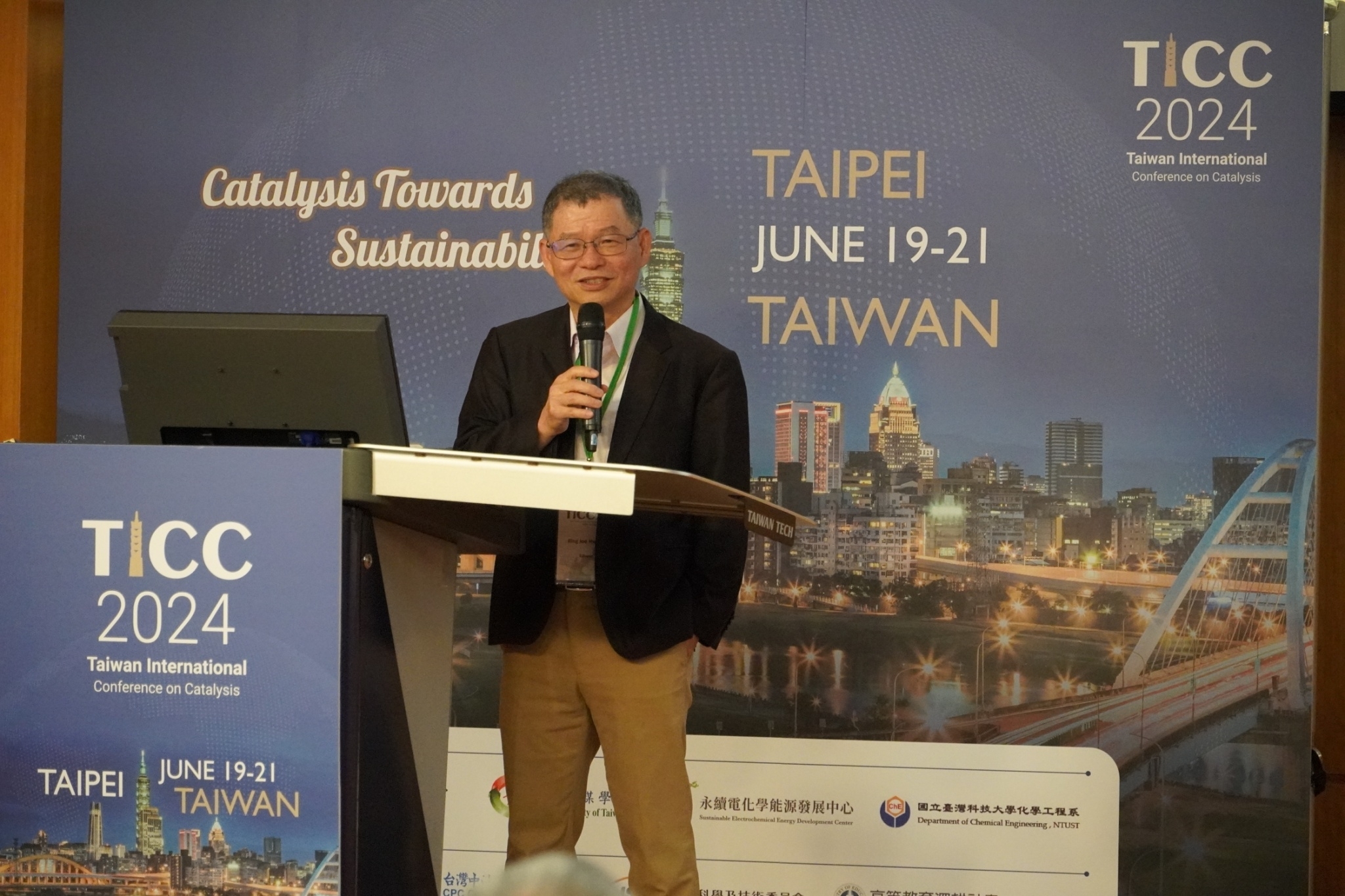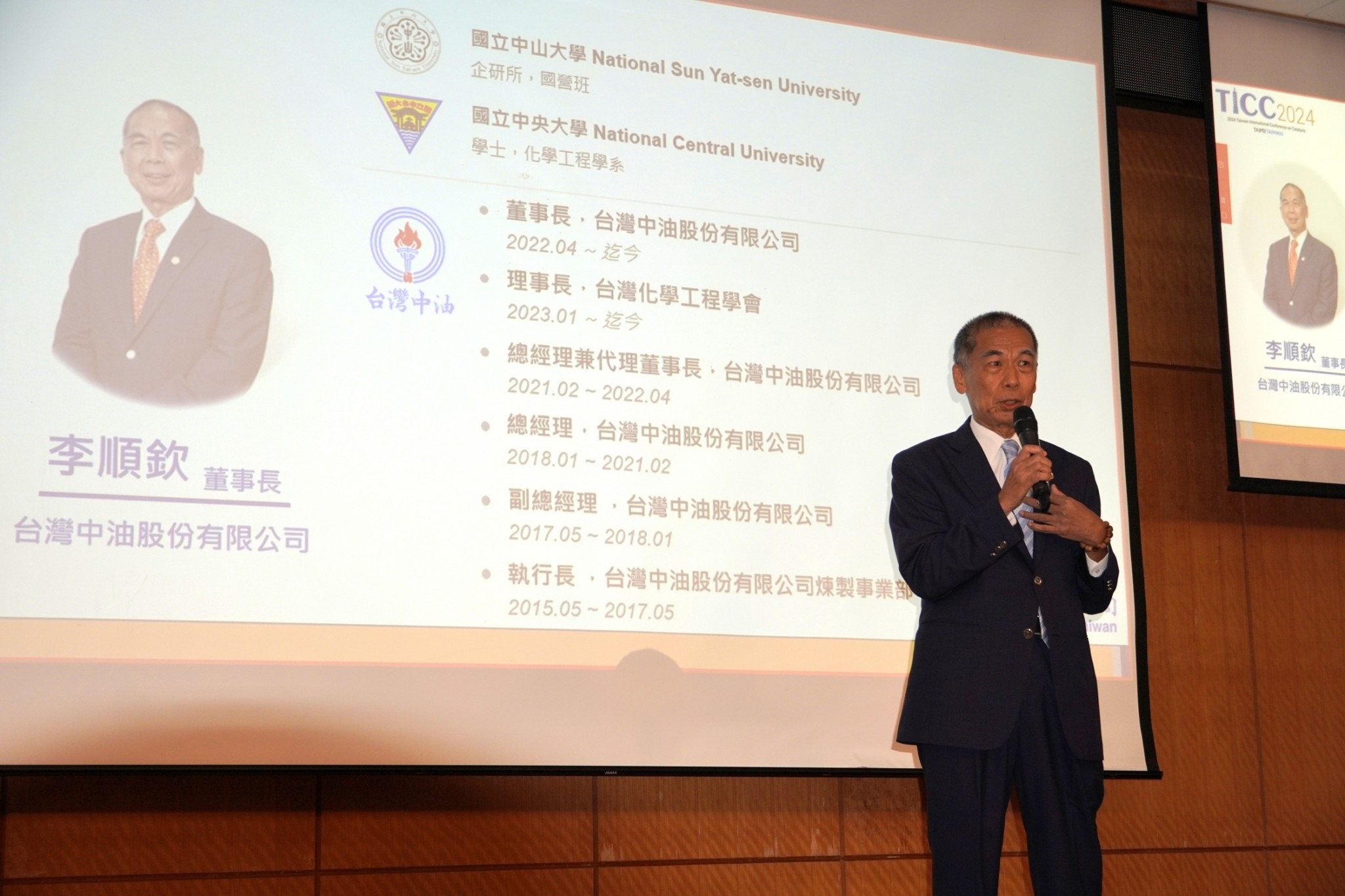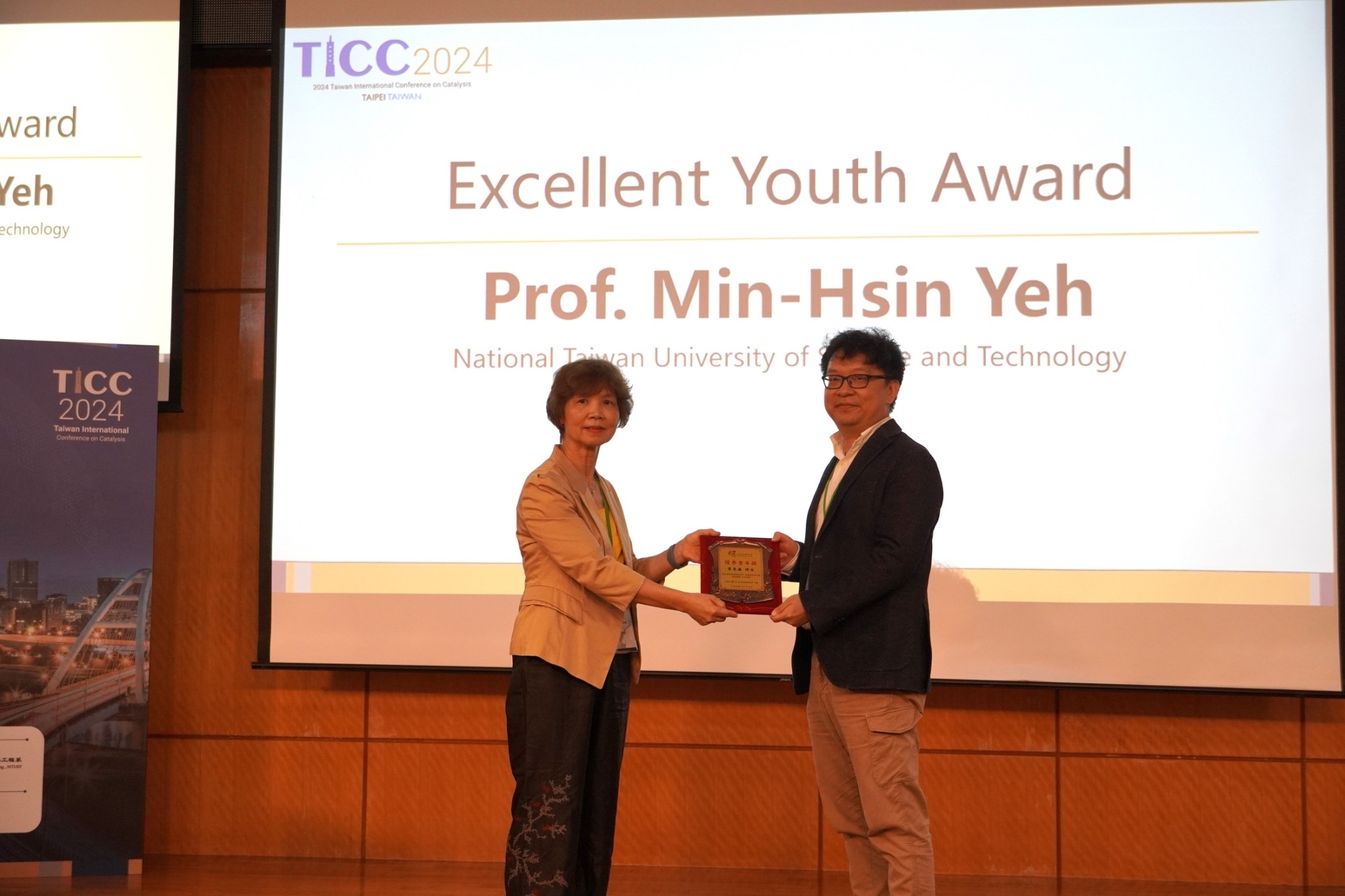Taiwan International Catalysis Symposium highlights Net Zero Emissions and Associate Prof. Min-Hsin Yeh wins Excellent Young Award.
Taiwan Tech and the Taiwan Catalysis Society jointly hosted the “2024 Taiwan International Catalysis Symposium” from June 19 to 21, 2024, themed “Catalysis Towards Sustainability”. The event featured 8 major sessions, 4 plenary lectures, 16 keynote speeches, and 49 invited talks. Additional activities included “Industrial forum”, “Student English oral presentation competition”, and “Student poster presentation competition”. The Taiwan Catalysis Society also presented the Excellent Young Award to Associate Professor Min-Hsin Yeh from Taiwan Tech, encouraging young scholars under 40 to dedicate themselves to catalysis-related research and development.
In his opening speech, Chairman Bing-Joe Huang, National Chair Professor, said that net-zero is like a great revolutionary wave, and any industry will face unlimited challenges. He emphasized the need not only to understand and address the challenges but also to foresee and prepare for the future to enhance high-quality competitiveness.

Chairman of the conference, National Chair Professor Bing-Joe Huang delivered a speech.
On the 19th, the “Industrial Forum” centered around the theme of “Net Zero Carbon Emissions”, was moderated by Chairman Shun-Chin Lee of CPC Corporation, Taiwan. The panel included Chief Ding-Zhang Guo from China Steel Corporation, CEO San-Tai Huang from CPC Corporation, Taiwan, Dr. Ming-Wei Yang, Deputy Researcher at Taiwan Power Company, and Manager Jia-Wei Tsai from BASF, Germany. They shared insights and experiences on planning for and achieving net zero carbon emissions.

Chairman Shun-Chin Lee of CPC Corporation, Taiwan, presided over the industrial forum.
Chairman Shun-Chin Lee stated that the chemical industry transforms low-value substances into valuable ones. By utilizing catalysts, it can lower reaction temperatures and pressures, thereby reducing carbon emissions. CPC Corporation, Taiwan, focuses on three main directions in transitioning from planning to action for achieving “net zero carbon emissions”: optimizing oil refining to produce high-value petrochemicals, developing technologies for carbon capture and storage to reduce emissions, and advancing clean energy solutions to develop zero-carbon energy sources.

The industrial forum featured comprehensive discussions. From left to right in the photo are Dr. Ming-Wei Yang, Deputy Researcher at Taiwan Power Company; Manager Jia-Wei Tsai from BASF, Germany; Chairman Shun-Chin Lee of CPC Corporation, Taiwan; CEO San-Tai Huang of CPC Corporation, Taiwan; and Chief Ding-Zhang Guo of China Steel Corporation.
In the past, the steel industry has been perceived as high-energy and high-carbon emitting. Therefore, China Steel Corporation has dedicated recent years to energy conservation and carbon reduction. They have developed short-term carbon reduction strategies and outlined medium to long-term plans to achieve low-carbon and eventually zero-carbon emissions by 2050. Taiwan Power Company is planning for net zero carbon emissions by focusing on low-carbon fuels, carbon capture technologies, and the transformation of thermal power plants. In 2022, they proposed a robust grid plan with an investment of NT$500 billion over 10 years. BASF Germany divided sustainable development into three aspects: economic, environmental, and social dimensions, which are integrated into their corporate mission, strategies, goals, and operations.
Additionally, on the morning of the 20th, the Taiwan Catalysis Society awarded the “Outstanding Paper Award” and “Excellent Young Award”. Professor He-Xiu Zhou and Assistant Professor Dong-Han Yang from the Department of Chemical Engineering at National Tsing Hua University received the “Outstanding Paper Award”. Associate Professor Min-Hsin Yeh from the Department of Chemical Engineering at Taiwan Tech was honored with the prestigious “Excellent Scientist Award”, a recognition limited to one recipient annually.

Associate Professor Min-Hsin Yeh from the Department of Chemical Engineering at Taiwan Tech (on the right) received the “Excellent Scientist Award”. On the left is Chairperson Shu-Fen Zheng of the Taiwan Catalysis Society.
Associate Professor Min-Hsin Yeh has long-term research on three major issues in sustainable energy, including: how to effectively collect sustainable energy, how to properly store sustainable energy, and how to use sustainable energy wisely. He has published 104 SCI papers, cited 7,865 times to date. Last year (2023), he received prestigious honors including the Outstanding Paper Award from the “Taiwan Chemical Sensors Technology Association”, the Outstanding Young Scholar Award from the “Taiwanese Colloid and Interface Society”, and the Teng-Hui Lee Outstanding Young Professor Award from the “Taiwan Institute of Chemical Engineers”.
Associate Professor Min-Hsin Yeh said that he was very honored to be recognized, and he was especially grateful to his mentors – Professor Bing-Joe Hwang of the Department of Chemical Engineering of Taiwan Tech and Professor Kuo-Chuan Ho of the Department of Chemical Engineering of National Taiwan University. He considers himself fortunate to have been inspired by their different research perspectives and concepts throughout his academic journey, which ignited his passion and dedication to academic research.
Taiwan Tech is actively responding to the international consensus on achieving net zero carbon emissions and sustainable development. They have incorporated sustainable campus carbon reduction as a key agenda in their administration, having completed a greenhouse gas inventory in 2023 and implemented carbon emission reduction management mechanisms. They have set ambitious goals to achieve 50% carbon neutrality by 2030 and aim for 100% carbon neutrality by 2049.
